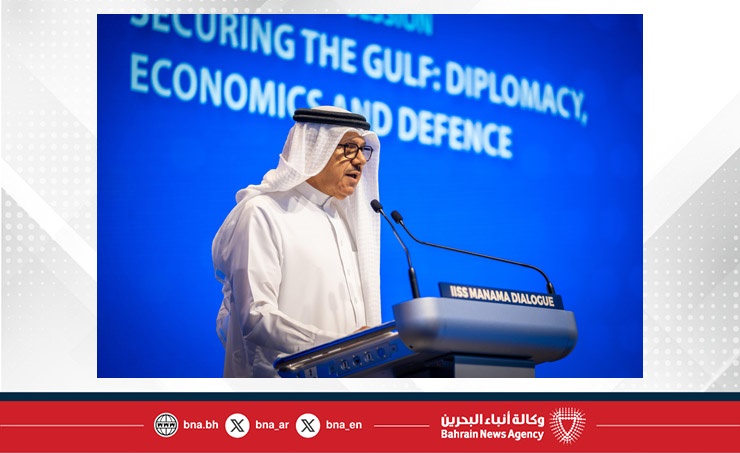Foreign Minister: True security is multi-layered and requires sustained, genuine collaboration among nations

Manama, Nov. 1 (BNA): True security is multi-layered and depends on sincere and lasting cooperation among nations, said Dr. Abdullatif bin Rashid Al Zayani, Minister of Foreign Affairs.
Dr. Al Zayani said it must be built on a vision that aligns with the aspirations of the region’s peoples that is grounded in coexistence, tolerance, and respect among diverse religions, cultures, and beliefs.
Speaking at the plenary session titled “Securing the Gulf: Diplomacy, Economics, and Defence”, held during the 21st IISS Manama Dialogue 2025, organised by the International Institute for Strategic Studies (IISS) in cooperation with the Ministry of Foreign Affairs, Dr. Al Zayani highlighted that Bahrain firmly believes conflicts are best resolved through mutual understanding and dialogue. Fostering environments that unite communities to face shared challenges, he said, is essential to confront common challenges.
He added that education and cultural exchange play a vital role in promoting tolerance, building trust, and ensuring that every voice contributes to shaping the future.
Dr. Al Zayani said security fundamentally means protecting national territory, safeguarding citizens and infrastructure, and maintaining global connectivity through freedom of navigation, cybersecurity, and the free flow of trade and information. He noted that sustainable security depends on genuine cooperation with regional and international partners, noting Bahrain’s pride in its defence partnerships within the GCC and with international allies through counterterrorism and anti-piracy coalitions, as well as initiatives to enhance maritime security and capacity-building.
He highlighted Bahrain’s hosting of the Combined Maritime Forces, a 47-nation coalition that secures vital maritime routes in the Arabian Gulf, the Red Sea, and the Gulf of Aden, as well as the establishment of the Arab League Council of Cybersecurity Ministers, which reflects the region’s proactive approach to emerging threats.
Dr. Al Zayani added that cooperation is further strengthened by agreements such as the GCC Joint Defence Agreement, which states that an attack on one member is an attack on all, making collaboration the cornerstone of regional stability. He emphasised true security cannot be achieved by a single nation acting alone.
The minister underscored the importance of economic development and regional integration as key components of security.
He said: “A fragmented, region beset by economic instability, in which people’s aspirations remain unfulfilled, can never be fully secure. But by fostering economic interdependence we can provide immediate benefits for our citizens while reinforcing trust and cooperation, and make conflict less likely”.
Within the GCC, Dr. Al Zayani said member states are advancing toward completing the Customs Union and establishing a Common Market, laying the foundation for full GCC citizenship while deepening global trade and investment ties, including through free trade agreements with international partners.
He also cited the Comprehensive Security, Integration and Prosperity Agreement (C-SIPA), signed between Bahrain and the United States and later joined by the United Kingdom, as a practical example of how prosperity and security are interconnected. The agreement, he said, embodies the enduring truth that shared is inseparable from shared prosperity.
He added: “We hope this framework will include more partners who share our vision for a rules-based, cooperative order in the Gulf”.
Dr. Al Zayani highlighted the role of effective diplomacy that respects sovereignty, advocates for non-interference, promotes peaceful settlement of disputes and fosters good neighbourly relations. He said this vision, guided by the leadership of His Majesty King Hamad bin Isa Al Khalifa, continues to shape Bahrain’s foreign policy, as the Kingdom works to build “Coalitions for Peace” to strengthen regional stability.
Addressing regional issues, Dr. Al Zayani said the root of instability in the Middle East lies in the Palestinian–Israeli conflict, stressing that without a just and lasting resolution, it will continue to undermine all efforts to achieve genuine security.
He expressed optimism about the recent progress of international diplomacy on Gaza, particularly the Peace Plan proposed by His Excellency Donald Trump, President of the United States of America, and supported by regional mediators.
He noted: “This could represent a pivotal moment, as the first phase has already brought a ceasefire, the release of hostages and detainees, and the delivery of humanitarian aid to Palestinian civilians”.
Dr. Al Zayani said the plan could serve for a peaceful, stable and prosperous Gaza, which could facilitate a broader regional peace. He underscored the need for renewed diplomatic commitment to ensure that all parties fulfil their obligations comprehensively and in good faith, with the support of all nations seeking peace in the Middle East.
The Minister stressed that a secure and prosperous Gulf and Middle East will remain an elusive goal unless the Palestinian people achieve their legitimate right to an independent and sovereign state, living in peace and security alongside Israel.
Dr. Al Zayani said that this objective must be complemented by the resolution of the Iran nuclear file through renewed negotiations between the United States and Iran, aimed at addressing regional concerns.
He added: “We must also support Lebanon in implementing UNSC Resolution 1701 and the Taif Agreement, assist Syria on its path toward stability, back the efforts of Saudi Arabia and Oman to advance peace in Yemen, and support the Quartet in mediating a peaceful resolution in Sudan.”





